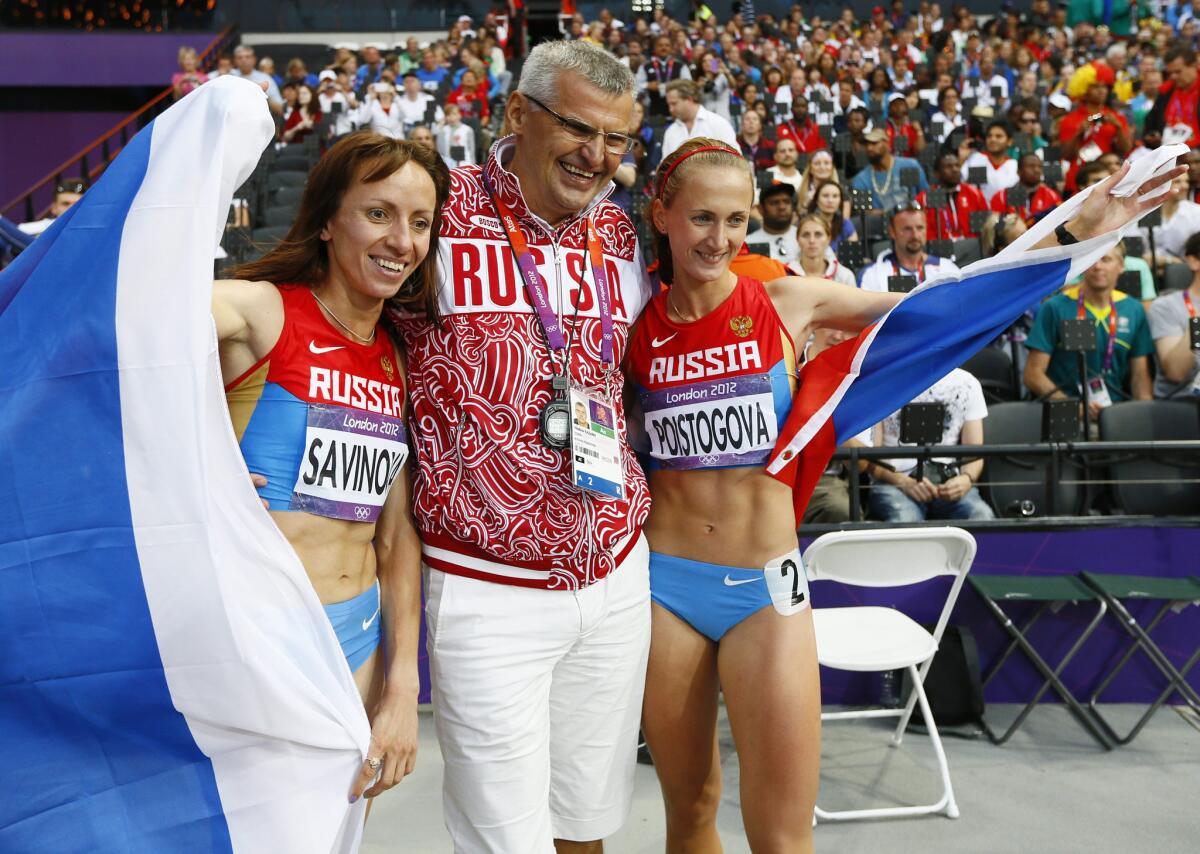Years of cheating by Russian track and field athletes detailed in report

Russian athletes Mariya Savinova and Ekaterina Poistogova celebrate with Coach Vladimir Kazarin after the women’s 800m final at the 2012 Olympic Games. Both athletes are among five Russian runners targeted for a lifetime ban.
- Share via
In a 323-page report that occasionally reads like a spy novel, anti-doping authorities detailed years of cheating by Russia’s track and field athletes in a program that may have involved the government.
The World Anti-Doping Agency’s independent commission alleges that coaches and team doctors in the country promoted a “win at all costs” mentality, encouraging and sometimes pressuring athletes to use performance-enhancing drugs.
The investigation also found that track officials manipulated test results and agents from Russia’s counterintelligence service, the FSB, infiltrated an anti-doping lab in Moscow to intimidate personnel.
“It’s worse than we thought,” said Dick Pound, the commission’s president and an influential member of the International Olympic Committee.
Issuing the report in Geneva on Monday, he added, “It may be a residue of the old Soviet Union system.”
The independent commission recommended that, unless reforms are instituted immediately, Russian track athletes should be banned from future competitions, including the 2016 Summer Olympics.
The Russian Ministry of Sport responded with a statement pledging to take action.
“We are not surprised by most of the points in the report,” the statement said. “We are fully aware of the problems in the All-Russia Athletic Federation and we have undertaken measures to remedy the situation.”
The federation had already replaced its president and head coach and is “currently rejuvenating” the coaching staff, the ministry said.
Monday’s news dovetails with an ongoing investigation of corruption within the international track federation, known as IAAF, whose former president faces criminal charges for allegedly soliciting bribes to suppress positive doping tests.
The current president, Sebastian Coe, said that he would seek a quick response to WADA’s report. Potential penalties could include a full suspension of the Russian federation and its athletes.
“We will do whatever it takes to protect the clean athletes and rebuild trust in our sport,” Coe said.
Less than nine months before the 2016 Rio de Janeiro Games, IOC officials characterized Monday’s developments as “deeply shocking” and “very saddening to the world of sport.”
Though a striking number of Russian track and field athletes had tested positive in recent years, it took a 2014 German television documentary to trigger the formation of WADA’s independent commission.
Commission members spent nearly a year conducting interviews and studying documents, working in tandem with Interpol, the global police body that is cooperating with French police on the IAAF case.
The commission’s findings evoke memories of the former East Germany and its decades of state-sponsored doping that finally came to an end with the collapse of communism there.
In Russia, investigators found that, while many athletes agreed to take performance-enhancing drugs, those who refused were denied top-flight coaching and support.
Hundreds of test samples were allegedly manipulated or destroyed to avoid detection. The report claims that officials may have used a second laboratory in Moscow to pre-screen samples and circumvent positive results.
“While written evidence of government involvement has not been produced,” the report stated, “it would be naive in the extreme to conclude that activities on the scale discovered could have occurred without explicit or tacit approval of Russian governmental authorities.”
Despite the findings, Pound suggested that Russian athletes could be allowed to participate in the Rio de Janeiro Games if their federation makes the right changes.
“I think they can do it,” he said. “I hope they can.”
Twitter: @LATimesWharton
More to Read
Go beyond the scoreboard
Get the latest on L.A.'s teams in the daily Sports Report newsletter.
You may occasionally receive promotional content from the Los Angeles Times.











